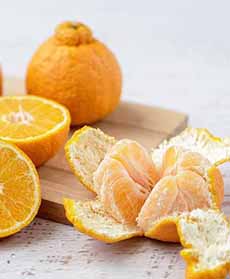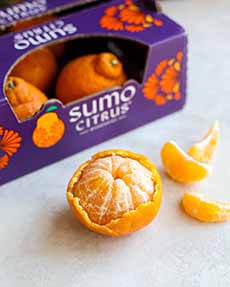It’s Sumo Citrus Season: Gather A Supply Of Sumo Mandarins
|
Sumo Citrus has hit the shelves at grocers near you. Available nationwide* annually from January to April. you can easily recognize them by their topknot—reminiscent of the hair of sumo wrestlers. Sumo Citrus is one of the world’s largest and sweetest mandarins, celebrated for its sweet taste and distinct looks. Originally from Japan, Sumo Citrus is now grown in the U.S. Compared to the navel and other oranges, Sumo Citrus is easy to peel. It’s seedless, super-sweet, and juicy: a no-mess snack. It’s a bit more expensive than other mandarins. According to SumoCitrus.com, Sumo Citrus is the most difficult citrus to grow. It takes four years of constant care before a Sumo Citrus tree produces any fruit. Despite its rugged appearance, it’s a delicate fruit that requires far more expertise and gentle handling than any other piece of citrus. Each Sumo Citrus tree is carefully groomed by hand every year and then hand-picked and hand-packed. Even the trailers used to transport Sumo Citrus are designed to give it a smooth (vs. bumpy) ride! Here’s more about Sumo Citrus. The term “mandarin orange” is incorrect. Mandarins and oranges are separate species, as you can see from the taxonomy below. From a visual perspective: From a hybridization perspective, the mandarin is a progenitor of the orange. The orange is a cross between a mandarin and a pomelo, created long ago in China. Both are in the genus Citrus; the binomial classification of both mandarins and oranges branches at the species level (we’d call this “cousins”). For food geeks, here’s the entire taxonomy: |
|
|
|
________________ Retailers include Albertsons, H‑E‑B, Hy-Vee, Kroger, Osco, Pavilions, Publix, Ralphs, Safeway, Sams Club, Shaws, Sprouts, Target, Vons, Wegmans, and Whole Foods. †A clade is a branch that includes a single common ancestor; the group of its descendants is called a clade. A cladogram is an evolutionary tree that diagrams the ancestral relationships among organisms.
|
||





